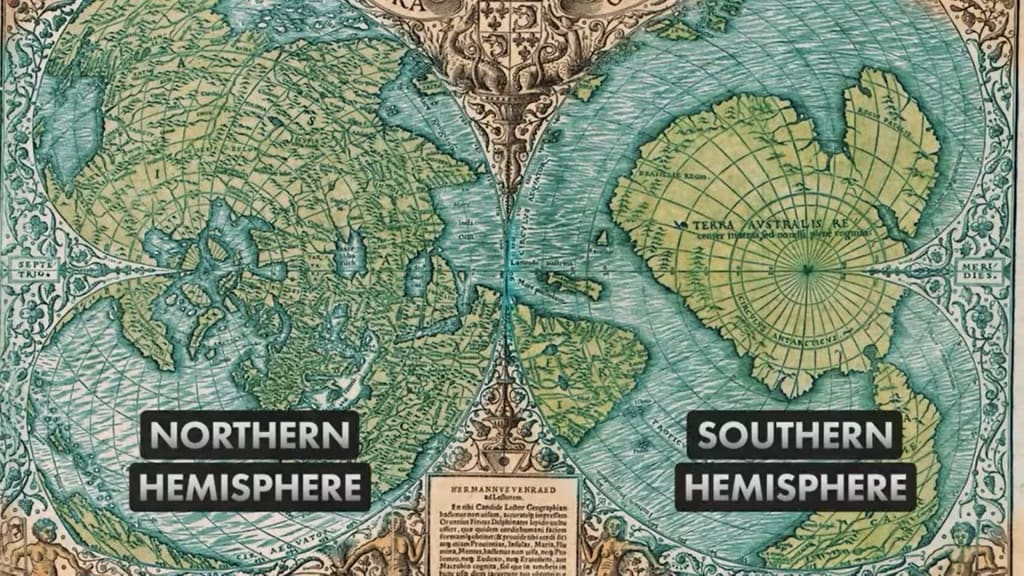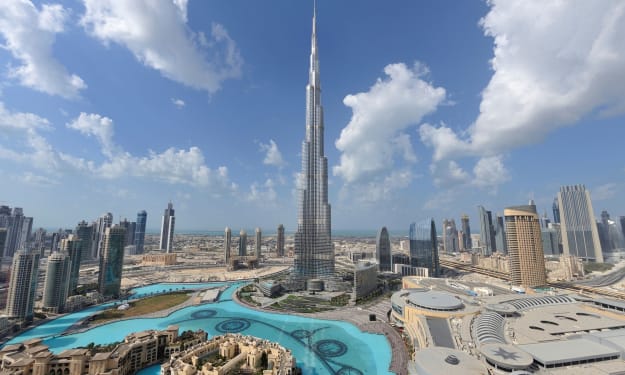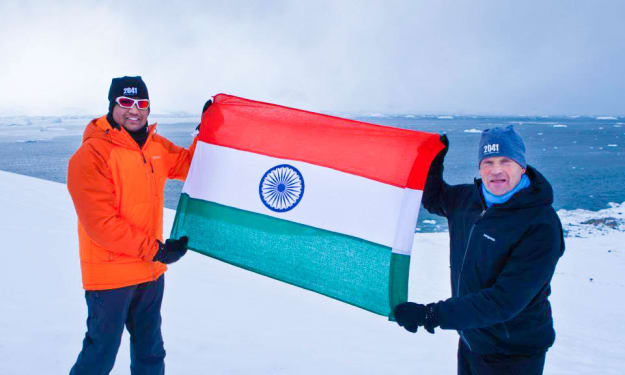What is the history of Antarctica?
Mystery of the 7th Continent

Antarctica is the main landmass which isn't a nation, doesn't have an administration, nor any native clans living there for a long time. One of the clearest reasons is that it is the coldest landmass on the planet. The temperature can go as low as - 89°C. Furthermore, it is additionally the windiest put on the planet. With blizzards at a speed of 300 km/hr. It can dazzle you.
Antarctica is likewise the world's driest landmass. To the degree that you may be shocked to realize that it is viewed as a desert. There's just around 51mm of downpour here, and in any event, when its downpours, it transforms into snow prior to arriving at the ground. So, as it were, Antarctica is the main put on Earth with practically zero impact from people. In any case, it doesn't imply that nations the whole way across the world haven't attempted to assume control over Antarctica.
Nations like France, Norway, Australia, England, Chile, Argentina, and New Zealand guarantee different pieces of Antarctica. So, is Antarctica really split between these nations?
We should start our story right toward the start. It was around 350 BC; the Greek rationalist Aristotle was among the main individuals to say that the Earth was round. At that point, the Greeks knew about the Cold locales in the North. They had named it the Arctos. The word 'Arctos' was gotten from the bear. The star groupings that we can find overhead, one of them is of the Incomparable Bear, were motivated by that heavenly body and named the Cold district, Arctos.
Since they realize that the Earth is circular, they realize that the North and South resemble identical representations and would have comparative highlights. So, they named the obscure southern district Antarctos. It implied something contradictory to the bear. Something contrary to Arctos. Furthermore, from here, the name Antarctic was determined.
People stepped on Antarctica interestingly during the 1890s, however many years before that, Antarctica had begun showing up on maps. At the point when a few pioneers went on endeavors all over the planet, that's what they knew whether they went toward the South of the world, they would happen upon some land. Yet, they didn't have any idea what was on the land precisely. Or on the other hand the way that enormous it is. This is the reason when the French adventurers made the world guide in the year 1530, they had drawn Antarctica.
Around 200 years after the fact, in 1773, English Maritime official James Cook turned into the primary individual to go toward the South of the Antarctic Circle. He was around 130 km farther from Antarctica, when he turned his boat around. Despite the fact that he hadn't seen Antarctica, he had seen chunks of ice with rock stores on them. At the point when he saw those stones, he reasoned that Land Australis exists. Yet, going a lot nearer to Antarctica was so hazardous. He was certain to such an extent that nobody could arrive at Antarctica, on the grounds that the spot was so unsafe. With solid breezes blowing and the boat at risk for hitting icy masses all of a sudden. Yet, his words were disproved 50 years after the fact.
It is very dubious concerning who was the main individual to step on Antarctica. Since a few groups guarantee to have been the principal individual. English American Commander John Davis accepted that he was the main individual to do as such, on the grounds that his boat was lost, and he arrived at Antarctica. The main undisputed landing was in 1895, when a Norwegian boat called the Antarctic, arrived at its shores. 6-7 individuals from the group of this boat got into a little boat and proceeded to land. A Norwegian in the boat was Carsten Borchgrevink, claims that he arrived before the boat, and he was quick to step on Antarctica. Be that as it may, a man from New Zealand, Alexander, cases to have been on this boat, and to keep the boat consistent, he was the first to get out of the boat. These two individuals from a similar boat got into a contention about who was quick to get off and the first to step on Antarctica.
After this, the initial 20 years of the 1900s are known as the Brave long periods of Antarctica. Since numerous endeavors were directed during this time, there were new logical revelations, and we figured out numerous new things about Antarctica. It was whenever we first figured out that there are plants becoming on this landmass. Greeneries were tracked down filling in Antarctica. After this brave time, came the Pilgrim time of Antarctica. at the point when a few nations attempted to make a case for Antarctica. somewhere in the range of 1908 and 1942, 7 nations asserted sway over this landmass. Argentina, Australia, Chile, France, New Zealand, Norway and the Unified Realm.
Aside from them, there were nations the USA, the Soviet Association, Japan, Sweden, Belgium, and Germany, who were leading investigations directing new campaigns on Antarctica, without guaranteeing any domain. During Hitler's standard, in 1939, a German Antarctic Campaign was done, in which they flew in a plane to take photos of certain region of the Antarctic. They even dropped metal Nazi Insignias, guaranteeing that the regions where the Insignias were dropped were heavily influenced by Nazi Germany. Shockingly, during this period, the USA wasn't exceptionally dynamic. In 1924, the Secretary of State in America, reported their authority position with respect to the regional cases in Antarctica. That's what he said assuming any nation finds new land in Antarctica, it doesn't imply that the new regions would have a place with the country. The land would have a place with the country just when there are real settlements nearby. At the point when the residents of that nation live there for all time. Yet, this didn't occur.
After the finish of The Second Great War, these nations began battling each other once again their cases on Antarctica's territory. By 'battling' I don't mean strict fighting, what I mean is that they were communicating their cases all the more unequivocally. These nations set up long-lasting examination communities in Antarctica. To show that they have a super durable station nearby. What's more, since specialists were living there forever, they guaranteed the land theirs. Assuming that you take a gander at the guide of Antarctica, there are a few islands close to Antarctica. The Heard and Macquarie Islands, on which Australia laid out stations in 1947-48. In 1953, France set up bases on Kerguelen and Crozet Islands. The following year, in 1954, Australia arrived at central area Antarctica. Also, set up the Mawson station. It was on Antarctica's mainland. After one year, Argentina set up the Overall Belgrano Station, this was in Antarctica on the Filchner-Ronne Ice Rack.
There's such a lot of ice in Antarctica, it makes it hard to be aware in the event that there is land under all that ice. Setting up research stations had turned into a political methodology of the nations. At a certain point, the English, Chilian, and Argentinian bases were so near one another, that it was plainly clear that they weren't set up exclusively for logical examination. It was obviously apparent that these stations were being set up for Knowledge exercises. The regional cases of these nations on Antarctica cross-over, truth be told.
In 1950, the Soviet Association government provided an update to the remainder of the world. Saying that assuming that a nation guaranteed Antarctica's domain without the Soviet Association's consent, Or on the other hand assuming it settled on choices in regard to Antarctica with the Soviet's support, the Soviets wouldn't perceive any such cases. At this point, the Virus War had broken out among America and Russia, and individuals were worried about the possibility that that the two nations would begin their international affairs in Antarctica also. These nations were at that point battling each other in various region of the world, yet nobody believed that them should be battling on Antarctica as well. In any case, fortunately, it didn't work out. In 1958, American President Eisenhower, gave notice to the other states, requiring a settlement to guarantee that Antarctica would continuously be a free and quiet spot. In Washington on fifteenth October 1959, a meeting was hung on it. On first December 1959, the Antarctic Settlement was agreed upon.
There were three significant focuses in this Deal. First: Antarctica would be utilized for quiet purposes just, second: Everybody would be allowed to do logical examination. Also, third: the aftereffects of the logical perceptions, would be unreservedly traded and accessible to all. At first, this Arrangement was endorsed by 12 state run administrations, including all nations which were guaranteeing an area on Antarctica. Yet, the most fascinating thing about this deal is that the cases of these nations weren't annulled.
This Deal only suspended those cases for a brief time. So legitimately, even now, these nations can keep on asserting those domains and they are doing so without a doubt. Australia guarantees the biggest offer. Australia claims 42% of Antarctica. Yet, it is likewise vital to see that America dismisses the cases of these nations. Not just America, a large portion of the nations all over the planet, reject these regional cases. Not just this, these 7 nations asserting region in Antarctica, don't perceive every other's cases. France, Australia, New Zealand, and Norway perceive every other's cases, yet the UK, Chile, and Argentina don't perceive every others' cases in light of the fact that their domains cross-over. Today, the nations that guarantee land in Antarctica, only have an emblematic case. This Arrangement had briefly suspended the cases, however it likewise intended that on the expiry of the Deal, these regional cases would become significant. For this reason these 7 nations have clutched their cases over Antarctica. This Deal is set to lapse in 2048. Post that, regardless of whether this settlement would be reestablished, should be seen. Be that as it may, fortunately, with the assistance of the Deal, in the current there has been almost no international relations in Antarctica, and more logical examination. This has helped researchers gigantically.
The Global Board of Logical Associations laid out an Exceptional Panel to direct research on the Antarctic. Under which researchers from various nations are planning together. To this end consistently, around 4,500 researchers go to Antarctica to work. Furthermore, a solid coordinated effort between researchers from various nations has been seen.
Afterward, in 1991, a Natural Security Deal was endorsed in Antarctica, otherwise called the Madrid Convention, since it was endorsed in Madrid, the capital of Spain. In this deal, at long last, limitations were placed on boring and mining exercises in Antarctica. No nation can do penetrating and mining in Antarctica. So Antarctica is secured. It was vital to do as such, in light of the fact that numerous nations are foragers with regards to oil. All the while assuming a pretense of 'investigation' of oil, an enormous number of spots have been obliterated. In a review from 1992, the US Geographical Overview specialists found, 19 billion barrels of oil under Antarctica can be recuperated.
Mineral travelers in Russia guarantee that there are 500 billion barrels of oil and gas under Antarctica. However, there are 2 justifications for why till currently oil mining hasn't been led in Antarctica. The Madrid Convention is the primary justification for the Settlement that keeps us shielded from such occasions, and the other explanation is that it will be very costly to do as such.
Basically, for the present. Yet, later on, because of environmental change, the danger might increment further. As this ice is dissolving because of environmental change, getting to Antarctica is becoming more straightforward. New innovations will be created with time, and maybe then it wouldn't be a costly issue. What's more, it turns out to be financially suitable to separate oil and gas from that point. As I told you, this Settlement will lapse in 2048. On the off chance that these nations don't recharge this Deal, this can be conceivable after that. A few nations have taken to fishing in the seas close to Antarctica and taking advantage of it. Like China. China has as of late extended fishing and the travel industry there. As a matter of fact, after the year 2000, China is the main country which has set up research stations in Antarctica. No other nation has set up new stations. Aside from this, as indicated by the information from 2018, there were a few personal ships, conveying rich confidential people which went to central area Antarctica, and unlawfully took advantage of nature there. A few nations discuss the sea around Antarctica, ought to go under another deal. to manage things, with the goal that there is no overfishing there. What's more, to guarantee that nobody enters the seas illicitly, and it turns into a safeguarded region too.
After 2003, there was a long-lasting actual presence of the Antarctic Deal too. The base camp is in Buenos Aries, Argentina. In the event that you take a gander at this in the feeling of international affairs, today, Antarctica isn't a country. It is a political domain where a few nations have met up to team up, and split power between them similarly. In any case, Antarctica has no police force, no military, and no overall set of laws. The provisos of this Arrangement should be visible being taken advantage of even at this point. For the travel industry, sightseers can go to the English station in Antarctica named the Port Lockroy, and can get their identifications stepped there. Indeed, even in the regions of Chile and Argentina, sightseers can get their travel papers stepped. It is one more way through which these nations express their cases.





Comments
Habeeb Rahman is not accepting comments at the moment
Want to show your support? Send them a one-off tip.